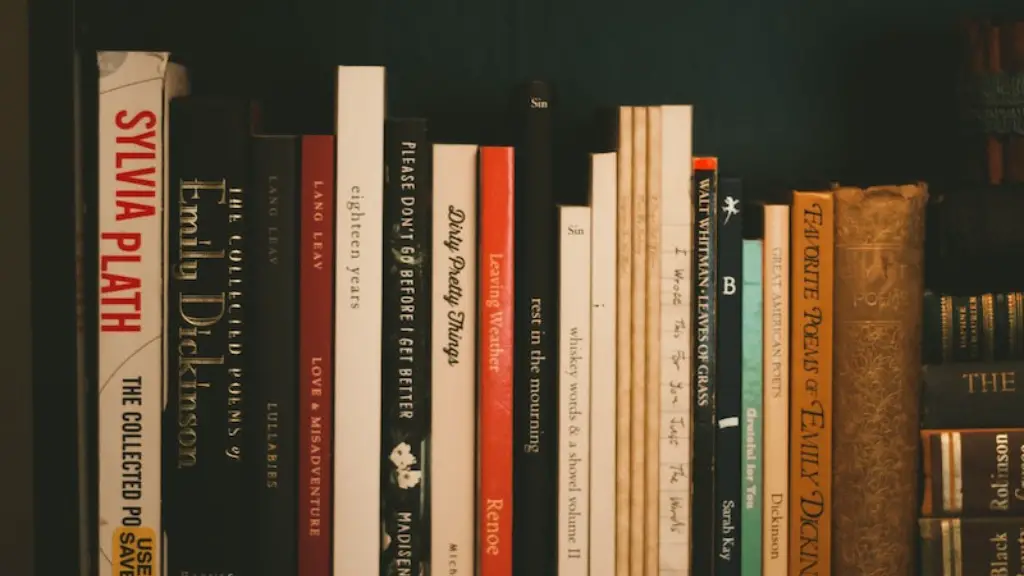Poetry serves a variety of purposes from providing a platform for expression, to providing a deeper understanding of the written word, to aiding in self-discovery. Poetry has the potential to be used as a tool for communicating tender thoughts, deep-seated fears, and dreams in ways that are impossible to express in any other medium. From its early roots as an oral tradition, to its ability to express complex meanings in minimal words and sentences, poetry continues to be a powerful and influential medium, inherently capable of conveying the human experience in an unparalleled fashion.
The power of poetry is often attributed to its ability to deliver a ‘message’. Many poets draw upon their vast knowledge and experience to shape the messages they wish to communicate through their work, rendering it charged with meaning and emotion. Poetry gives vent to emotions that are sometimes difficult to put into words. Through its use of figurative language and symbolism, poetry allows for the direct articulation of thoughts and feelings that can be hard to express through conventional means.
Furthermore, the unique structure of poetic language can be used to create meaning in ways that are not possible with everyday language. A great example of this is haiku – a traditional form of Japanese poetry – which can be used to express nuanced messages that would otherwise be lost in translation of meaning. Additionally, the reiteration of words and phrases in poetry can be used to create emphasis and deep resonance in the intended meaning of the poem.
Poetry also serves to bring clarity of language to a particular topic or experience. By carefully selecting particular words and phrasing to help convey distinct ideas, poets are able to craft words that are both beautiful as well as meaningful. This can be used as a means of communicating subtle nuances without having to explain every detail explicitly. Poetry can also be used to help connect people to a particular history or culture. By exploring the legacy of a particular culture through the message contained within the poem, individuals can develop an understanding of the nuances and complexities of a particular cultural identity.
In different ways, the ability of poetry to express the human experience is unparalleled. Through its use of figurative language and symbolism, poets can communicate succinctly and powerfully. Its poetic structure can be used to highlight and emphasise important messages. It can also bring clarity of language to a particular topic or experience, and provide a window into a particular history or culture. All of these aspects of poetry demonstrate that it is an invaluable medium for self-expression, discovering, and communication.
Providing Insight Into Emotions
Poetry can serve as a powerful tool for communicating the depths of human emotion. It is often credited with being able to express complex emotions in fewer words than spoken language. As a result, people can use poetry to express sensitive topics that might be difficult to discuss openly. Poetry can be a way to express grief, joy, and even confusion when dealing with difficult topics such as unfamiliar cultures or life experiences. By using the language of poetry, individuals can convey the depth of their experience without having to explicitly list every detail.
By articulating emotions in poetic words and phrases, individuals can make sense of their experience and, if desired, share it with others. The symbolism and figurative language in poetry can be used to convey sentiments that are otherwise difficult to verbalize. Furthermore, analyzing the words and phrases in a poet’s work can provide insight into the poet’s deepest thoughts and feelings on any particular topic. In this way, poetry can even be used as a means of self-discovery.
The poetic form can be harnessed to give subtlety and nuance to the dense emotions experienced in life. Use of poetic language is also a powerful way to convey frustration and anger, particularly when words fail to describe the intensity of the emotions. Through the careful selection of words and phraseology, poets can share their experience in ways that are passionate and resonant.
The ultimate aim is for the reader to understand the underlying emotion the poet is trying to communicate. As such, effective poets often include specific details in their work that help to elaborate on the sentiment of the poem, thusly allowing the reader to gain insight into the poet’s experience and emotions.
Exploring Themes, Symbols and Concepts
The use of symbolism, themes and concepts in poetry has long been a part of poetic tradition. Using literary devices such as metaphors and similes, poets can create a powerful backdrop of imagery and feelings that can capture the essence of an idea or experience. By abstracting themes, symbols and concepts, poets can use poetry as a means of conveying complex feelings and emotions which are difficult to otherwise explain. For example, many poets use nature imagery to explore themes of mortality, and various symbols to explore universal themes such as love and despair.
The poetic form allows poets to explore a variety of topics, from the everyday to the metaphysical and spiritual. Through the use of figurative language and layered imagery, poets can dive into a variety of topics without having to directly explain their meaning. This allows for individual exploration of ideas and concepts, which can provide the poet with a greater understanding of the human experience. Additionally, this can create an air of mystery in the poem which can leave the reader with greater questions – allowing them to fill in the gaps in the poem’s narrative with their own interpretation.
Using themes and symbols, poets can construct narratives and poetry that is both sophisticated and evocative. As such, poetry can provide the author and readers alike with a powerful tool to explore the human condition and experience in a meaningful and emotional way. Poetry can serve as a gateway to our innermost thoughts, showing us the depths of our character and helping us to better understand ourselves.
Exploring Narratives and Ideas
Poetry is not only a platform for self-expression – it can also serve as a means of communicating complex ideas and narratives. By selecting words and phrases that highlight specific elements of the narrative, poets can bring clarity to the ideas being communicated. This can be used to provide a deeper understanding of history, culture, and the world at large. Furthermore, poetic language can be used to explore the nuances of any particular narrative.
The use of imagery and symbols in poetry can help to shape powerful themes that echo through generations. Poetry can also serve as a way to share knowledge and tales that can otherwise be difficult to explain. By providing a platform to express deeper themes and ideas, poets can ensure their stories and experiences are preserved in a powerful and meaningful way.
Poetry can also be used to explore and critique existing societal structures, beliefs and systems. Through the use of symbolism and imagery, poets can create powerful messages that challenge the existing status quo and allow for new ways of understanding the complexities of a certain issue. By exploring issues from unconventional angles, poets can provide unique insights into both personal and societal problems that can ultimately be beneficial to a wider audience.
At its core, poetic language is a form of critique. By crafting a narrative that is both captivating and emotive, poets can comment on the state of the world and provide new perspectives on existing injustices. This is an invaluable use of poetry, as it provides much needed insight into societal issues that are often not adequately addressed or discussed.
Fostering Connection and Understanding
The ability of poetry to explore multiple perspectives on a particular event, emotion or experience can help to provide a deeper understanding between individuals and cultures. Through the use of powerful words, phrases and imagery, poets can communicate shared experiences in a way that is emotive and resonant. Likewise, understanding another poet’s words and the sentiment behind them can help create strong connections between people and foster a greater understanding of one another’s ideas and beliefs.
The ability of poetry to communicate across cultural, social and racial boundaries is one of its most powerful uses. Poetry has the ability to provide insight into the complexities of different perspectives and beliefs, allowing for a shared understanding of ideas and values that are not based on geographical and cultural divides. By using poetry to explore a variety of topics, poets can create common ground, enabling individuals from different backgrounds to share thoughts, beliefs, and opinions.
Poetry can also be used to bridge the gap between generation, allowing individuals of all ages to explore similar issues and perspectives. Through exploring shared experiences, stories, and themes, individuals can find common ground which can help to foster a greater understanding of one another’s ideas and beliefs. This understanding can also help create stronger communities within societies, based on shared understanding and respect.
As a result, poetry proves to be a powerful tool for creating experiences which can build connection and understanding between individuals, communities and cultures. By combining powerful words and imagery, poets can deliver messages that transcend language, distance and cultural divides.
Nurturing Creativity and Confidence
Writing and reading poetry can be a great way to nurture creativity and confidence in individuals. Reading poetry can be an engaging way to explore a variety of topics while understanding the nuances of language, imagery, and metaphors. Writing poetry can be a valuable form of self-expression and can open the door to the exploration of emotions and ideas in a meaningful way.
Writing poetry is also a great outlet for exploring and expressing difficult emotions. By articulating feelings through words and images, individuals can gain insight and understanding into the inner workings of their minds. Furthermore, as a creative practice, writing poetry can provide individuals with a sense of connection to the world at large, as writers can explore the beauty in the everyday and the power of their own thoughts and experiences.
The structure and format of poetry can also motivate individuals to develop their writing style and techniques. Experimenting with form and meter, as well as the use of language, can help to hone the writers craft. Similarly, writing about personal experiences can provide a powerful form of self discovery, as writers can gain a greater appreciation for the complexities of their own lives.
By exploring a variety of topics and techniques, writers can develop a greater understanding of the human experience and their own individual creativity. Through this practice, individuals can develop their writing skills, explore sentiment and emotion, and create powerful pieces of literature which can be shared with the wider world. In this way, writing poetry can be a powerful tool for emotional expression and creativity.





